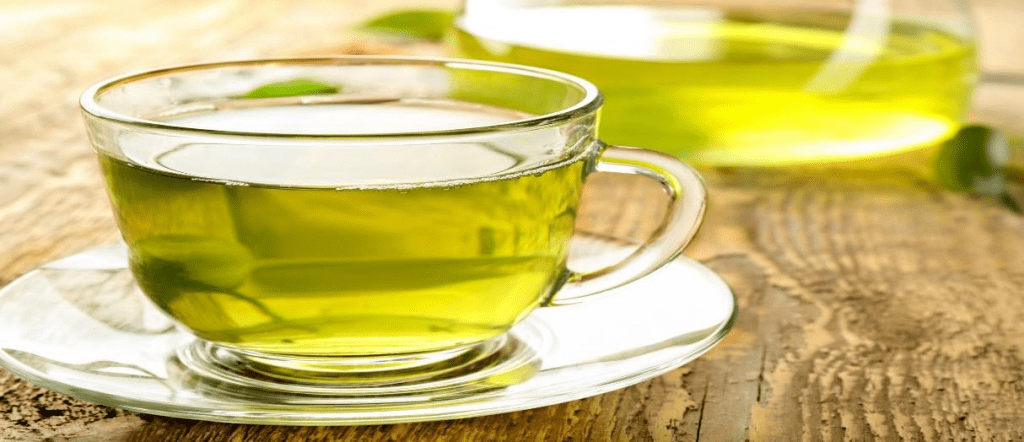Frequently referred to as the ‘healthiest drink on the planet,’ the endless list of health benefits offered by green tea is no secret. The drink, made from the leaves of Camellia Sinensis, is more popular than ever, with over 600,000 tons of it being consumed worldwide. While the age-old beverage does have a reputation for leaving behind a bitter taste in the mouth, it isn’t always the case. Available in a vast array of aromas and flavors ranging from vegetal to oceanic, the taste of green tea mostly depends on its style of preparation. Green tea, when appropriately prepared, is subtle yet full-bodied – an ideal drink to consume through the day, thanks to its mild demeanor.
History of the Tea:
Like many other discoveries, green Tea originated by accident. The story goes something like this… The great Chinese emperor Shennong was thirsty on a hot summer day and, in haste, consumed a drink of water in which a few dead leaves had, by chance, fallen into. Immediately, the emperor fell in love with the refreshing flavor of his newfound beverage, and voila, green tea was born. Obviously, there’s no real way to confirm the validity of this tale as it happened thousands of years ago (2327 B.C), but one thing is for sure — green tea was the first, and hence, the oldest form of tea ever consumed.
Jump ahead to 800 A.D, and another Chinese man named Lu Yu took green tea discovery to a more evolved level. Adopted by Buddhist monks at a very young age, our friend, Mr. Yu, spent many hours studying the various permutations of tea consumed by these monks. His interest in tea blossomed to the point where he even wrote a monumental book about it known as ‘The Classic of Tea,’ which narrated the culture and art behind preparing green tea.
Eventually, green tea made its way West, where it was referred to as ‘bullet tea’ due to the shape of its leaves. Surprisingly, it was made Great Britain’s national beverage by the 19th century. The oriental tea became so immensely popular that parliament even imposed a tea tax in the late 18th century. This led to some very upset tea enthusiasts, which subsequently led to the Boston Tea Party, resulting in over 45 tons of priceless green tea thrown out into the harbor.
Today, green tea is found virtually everywhere – cafes, restaurants, supermarkets, you name it. As people become more and more conscious about their health, consumption of the ancient beverage has only gone up.

Preparation: How to Make It
When it comes to preparing green tea, timing is everything. If the leaves are steeped in too early, they won’t infuse with the water properly; too late, and the tea will end up tasting bitter. Thus, the ideal temperature to steep the tea is when the water is around 90° Celsius.
The steps to make green tea is otherwise quite simple. First, take one spoon of green tea leaves for every cup of tea you’d like to make and place it into a strainer. Next, in a pan, allow an appropriate amount of water to boil, allowing the water to cool for around 45 seconds. Finally, pour the water into a mug, place the strainer into the mug and stir for about 2-3 minutes.
How to Best Consume Green Tea
Green Tea, like most other teas, is a drink best served hot. Moreover, it is also recommended that the tea be served in its most natural form, i.e., with as little razzle-dazzle as possible. To fully enjoy the drink’s flavor, keep it simple. That being said, if your sweet tooth complains, feel free to add a spoon of honey to the mix. This will give your green tea that pops of extra sweetness without taking too much away from the natural flavor. Green tea is available in a host of different flavors ranging from Jasmine to Chamomile; don’t hesitate to explore your options to find what you like best.

Health Benefits of Green Tea
Weight loss: While no beverage or food can burn off fat, the polyphenol found in green tea has been proven to help regulate the body’s metabolism by intensifying the level of fat oxidation in the body.
Heart benefits: A study published in the Journal of the American Medical Association concluded that the consumption of green tea is directly related to reduced mortality due to cardiovascular diseases.
Skin health: A study conducted in 2007 concluded that green tea could hold the key to the locked door that is the treatment for skin diseases such as psoriasis and dandruff. Moreover, often referred to as an anti-aging beverage, green tea has also been shown to reduce wrinkles, sun damage, and other antioxidant-related skin issues.
Antioxidant properties: The chemical antioxidant ‘catechin’ found in green tea is believed to be a powerful antibacterial/viral, making the tea an effective treatment for nearly everything from the common cold to cancer. A few studies have even shown its ability to prevent the spread of several diseases.

Nutrition and Caffeine Levels
Green tea is a zero-calorie drink in its most basic form, which makes it a popular beverage with health fanatics. The caffeine found in a cup of tea does vary depending on many factors, including the amount of tea leaves used and infusing time. But on the whole, green tea contains a minimal amount of caffeine. Approximately 30 mg per 250 ml. The other constitutes of green tea include polyphenol, an anti-inflammatory/carcinogenic/oxidant chemical, which accounts for about 30% of the tea’s weight.
Recipes
1. Citrus Mint Iced Tea: While preparing regular green tea, throw in some mint leaves, a couple of slices of orange, and a spoon full of honey. Once stirred, serve over ice and garnish with lemon slices.
2. Mango Calendula Ceylon Tea: While originally made to be consumed plainly, a simple addition of sweetened mango and ginger to a tall glass of green tea can make for a delightful afternoon drink on a sunny day. Stir in a spoon of honey to accentuate the sweet flavors.
References
- http://www.o-cha.net/english/teacha/distribution/greentea3.html
- https://www.hackberrytea.com/blogs/tea-education/the-history-of-green-tea
- https://www.stylecraze.com/articles/2-simple-ways-to-prepare-green-tea/#HowToMakeGreenTeaAtHome?
- https://www.lifehack.org/articles/lifestyle/11-benefits-of-green-tea-that-you-didnt-know-about.html
- https://www.medicalnewstoday.com/articles/269538.php#benefits
- https://www.canadianliving.com/health/nutrition/article/10-healthy-green-tea-recipes



